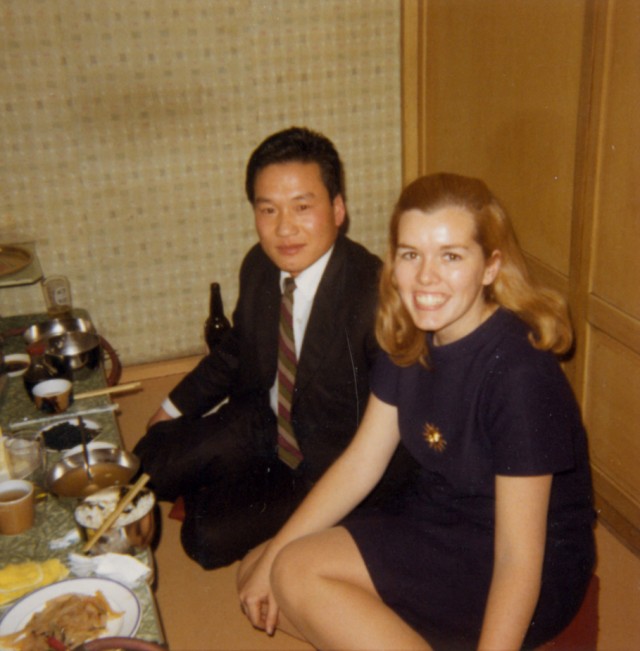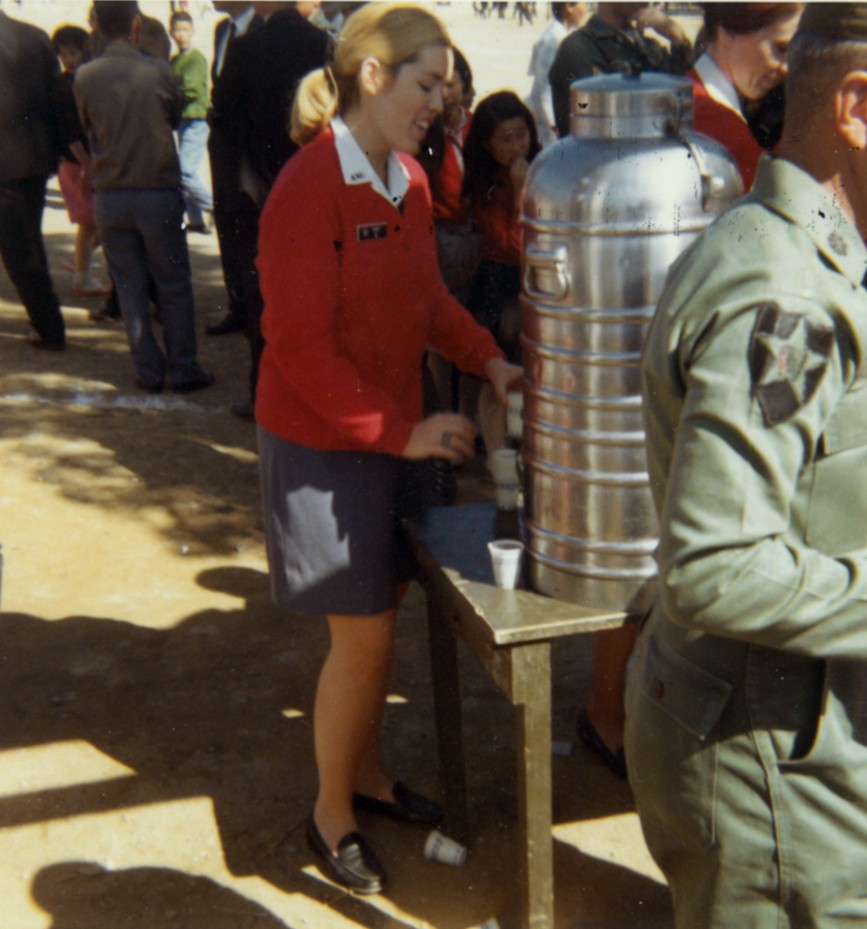Christmas Eve 1969 was a cold and lonely holiday for a group of Soldiers on the Korean Peninsula. Instead of celebrating with families, they spent the night in their foxholes guarding the demilitarized zone between North and South Korea.
It was lonely, that is, until young American women from the Red Cross called "Donut Dollies" arrived in the field, bearing comfort, cheer, hot coffee and fresh donuts.
One of the Red Cross "girls," as they were also called, was my mother, Patricia Moran (now Lorge), who served in South Korea in 1969-1970, and again in 1972-1973 as a program supervisor.
She and eight other women worked for the 2nd Infantry Division unit of the Red Cross' Supplemental Recreation Activities Overseas program, designed to boost troop morale with refreshments and entertainment programs.
"The Red Cross recreation programs in South Vietnam and Korea encourage active Soldier participation in activities that provide a relaxing break...and keep young Americans in touch with home. Quizzes, skits, music, informative discussion groups, and general fun programs are the order of the day when the 'chopper' sets down with its team of Red Cross girls," read a 1969 newspaper clipping my mother gave me.
According to the Red Cross Museum, a total of 899 Donut Dollies served in South Korea from 1953 to 1973, traveling almost three million miles by jeep and helicopter. Another 627 served with the SRAO in Vietnam from 1962 to 1973.
Mom's base camp was Camp Pelham at Musan, near the Imjin River and approximately five miles from the DMZ.
She was later assigned to four of the other 10 SRAO units in Korea, but Christmas at the DMZ was one of her most memorable experiences.
She's told me many times that she would never forget the looks on the faces of those Soldiers. They were the only American women most of them had seen since leaving the States, and the Soldiers were stunned and thrilled that American girls would travel so far to spend Christmas with them.
"It was quite a treat," she remembered.
Donut Dollies in the 2nd Inf. Div. traveled 20-50 miles a day to entertain 10-100 Soldiers. An average week included at least 75 program stops, according to a 1969 unit description.
In addition, the Red Cross girls hosted a weekly radio program on Armed Forces Korea Network Radio, distributed about 600 birthday cards a month and - of course - 11,000 to 15,000 donuts a month.
"The Red Cross classified us as recreation workers," Mom said. "The informal, casual term most often used by the GI's was Donut Dolly. The name was given to us because everywhere we went, we took donuts, fresh baked daily by Korean bakers, for the troops. This was, no doubt, meant to bring a little bit of home to the troops."
They more than succeeded. "Military commands termed the services of the Red Cross 'indispensable' and a 'prime factor' in their efforts to maintain the morale of their men at a high level and to look after their welfare," according to Sharon Lewis Dickerson on the Vietnam Women's Memorial Foundation Web site.
Mom was recruited by the Red Cross right after college. Given a choice between Korea or Vietnam, she chose Korea because her brother was leaving for a tour in Vietnam as a Marine helicopter pilot.
"I remember thinking I could not do that to my mother," she said. "There was no pressure, but I really think (my parents) never believed I would go through with it." So while Mom served coffee on the DMZ that Christmas, my grandmother spent the holiday listening to Elvis' "Blue Christmas."
It wasn't Vietnam, but South Korea in the late-1960's/early-1970's was not an easy assignment. Almost 20 years after the cease-fire ending the Korean War in 1953, the Korean Peninsula still resembled a war-zone, with frequent border skirmishes and international incidents.
On Jan. 23, 1968, for example, the North Koreans attacked the USS Pueblo, a U.S. Navy spy ship in international waters. One American was killed, several were wounded and the rest of the crew was held prisoner for almost a year.
Because of the tensions, my mother said Donut Dollies always traveled with an armed escort in sandbagged trucks with "flak" jackets and helmets when north of the Imjin River.
Living conditions were also somewhat primitive: "Our 'hooch,' has central heating - sometimes; hot water - sometimes; and electricity - sometimes. We have a fireplace which we use when we can get dry wood," said the unit description.
Because of the conditions, the Red Cross girls received hardship allowances, but Mom said these difficulties paled in contrast to the new culture. They were treated well by Soldiers and Koreans alike and often dined on pheasant under glass and other delicacies.
She said they never felt in danger. "It was too much fun. More exciting than anything else. I can't think of anyone who was worried.
"It was the best job I've ever had. Everything else pales in comparison. Nothing was routine. We were in a foreign country and were able to travel all the time and meet interesting people. Opportunities most people would never have, to go places and do things I would never have dreamed of," she said.
She was back in Seoul in 1973 as a supervisor when the Red Cross ended the program - in Vietnam because the United States was pulling out, and in Korea because the situation had stabilized somewhat.
"We went to the troops; we visited small, isolated locations, where they didn't have a chance to go anywhere or relax," she said. "By 1973, I think, units had more of a chance to stay in one place and the Army started building more permanent recreation centers. The program sort of wore itself out.
"It was the time of my life."
(The original version of this report appeared in the "Monmouth Message" from Fort Monmouth, N.J. For information on Korea today, see the August 2008 issue of "Soldiers.")




Social Sharing